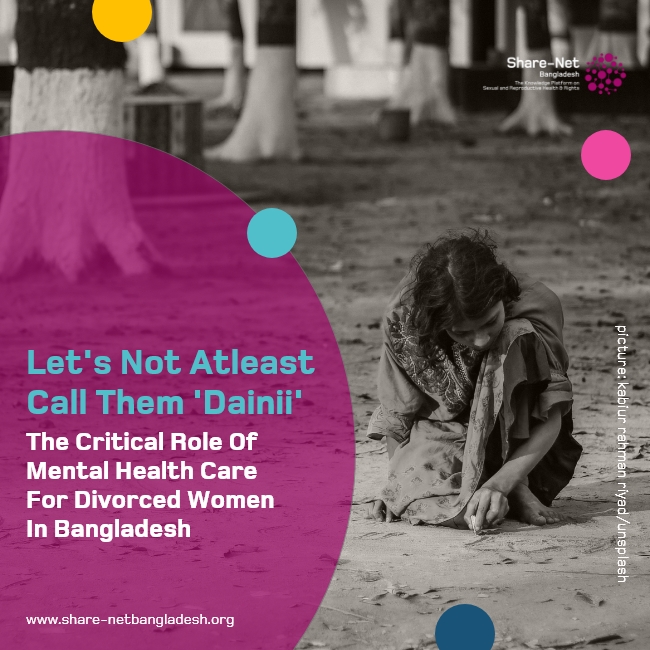Let’s Not At least Call Them ‘Dainii’: The Critical Role of Mental Health Care for Divorced Women
In Bangladesh, divorced women often face harsh societal judgment and are derogatorily labeled as ‘Dainii,’ meaning witch. This informal practice reflects the deep-seated negative attitudes towards women who seek to end abusive or unsatisfactory marriages. Despite numerous cases where men are primarily responsible for the breakdown of the marriage, women bear the brunt of the blame and stigma. This societal bias exacerbates their mental stress, adding to the trauma of divorce.
The term ‘Dainii’ is just one of many derogatory titles divorced women encounter, showcasing the pervasive gender bias in society. This blame game not only tarnishes their reputation but also severely impacts their mental health. The emotional toll of such slander can lead to depression, anxiety, and a sense of isolation. Addressing these negative attitudes and providing mental health support is crucial for helping divorced women rebuild their lives with dignity and confidence.
“On average, 37 divorces took place a day in Dhaka in 2022,” according to statistics from Dhaka North and South City Corporations. As divorce rates rise, the mental health of divorced women becomes a critical issue. Experts unanimously agree that ensuring mental health care for these women is vital for their well-being and for moving society forward.
Sexual and reproductive health and rights (SRHR) are key components of women’s overall health, especially after a divorce. Financial independence and self-esteem have increased among women, partly due to empowerment initiatives. However, this same empowerment can trigger conflicts within marriages, as seen in the case of Negar Sultana and Jahir Rana. Negar, a senior official at a United Nations agency in Dhaka, faced verbal and physical abuse from her husband Jahir, leading her to file for divorce. The societal backlash that follows often puts women’s mental health under severe strain, emphasising the need for robust support systems.
Mental health issues such as depression, anxiety, and trauma are common among divorced women. A survey by the National Trauma Counseling Center found higher rates of depression among married women aged 25 to 30 compared to their single counterparts. Post-divorce, women frequently encounter significant emotional and social challenges.
Dr. Mahbooba Nasreen, Pro-Vice-Chancellor of Bangladesh Open University, noted that societal norms and gender differences exacerbate the negative impact of separation on women. This situation underscores the importance of mental health services to help women rebuild their lives.
The Sustainable Development Goals (SDGs) aim to promote well-being for all, which includes mental health. SDG 3 targets good health and well-being, emphasising the need for accessible mental health care. Ensuring mental health care for divorced women aligns with this goal and supports SDG 5, which aims to achieve gender equality and empower all women and girls. By addressing mental health issues, society can help women regain their confidence and security, enabling them to contribute positively to their communities.
The Bangladesh Bureau of Statistics (BBS) reports that the divorce rate in the country has been rising over the past 15 years. Family violence, infidelity, and unmet marital expectations are significant contributors to this trend. Additionally, sociocultural factors such as child marriage, dowry, and discrimination further complicate the situation for women. Mental health expert Professor Meghla Sarkar highlights the trauma that accompanies separation, noting the need for empathetic support to help women navigate this difficult time.
The government of Bangladesh has made strides in improving healthcare services, with initiatives focused on maternal health and community clinics. However, mental health care, particularly for divorced women, remains an area needing urgent attention. Strengthening mental health services and creating supportive environments for women post-divorce are essential steps towards achieving the SDGs related to health, well-being, and gender equality.
The intersection of SRHR, mental health, and the SDGs highlights the importance of providing comprehensive support for divorced women. By ensuring their mental health and well-being, society can help them lead normal, fulfilling lives. This approach not only benefits the women themselves but also contributes to the overall progress and stability of the community. Addressing the mental health needs of divorced women is not just a matter of individual well-being; it is a crucial step towards achieving broader societal goals.
Source: BSS News
Picture Credit: Kabiur Rahman Riyad/Unsplash


